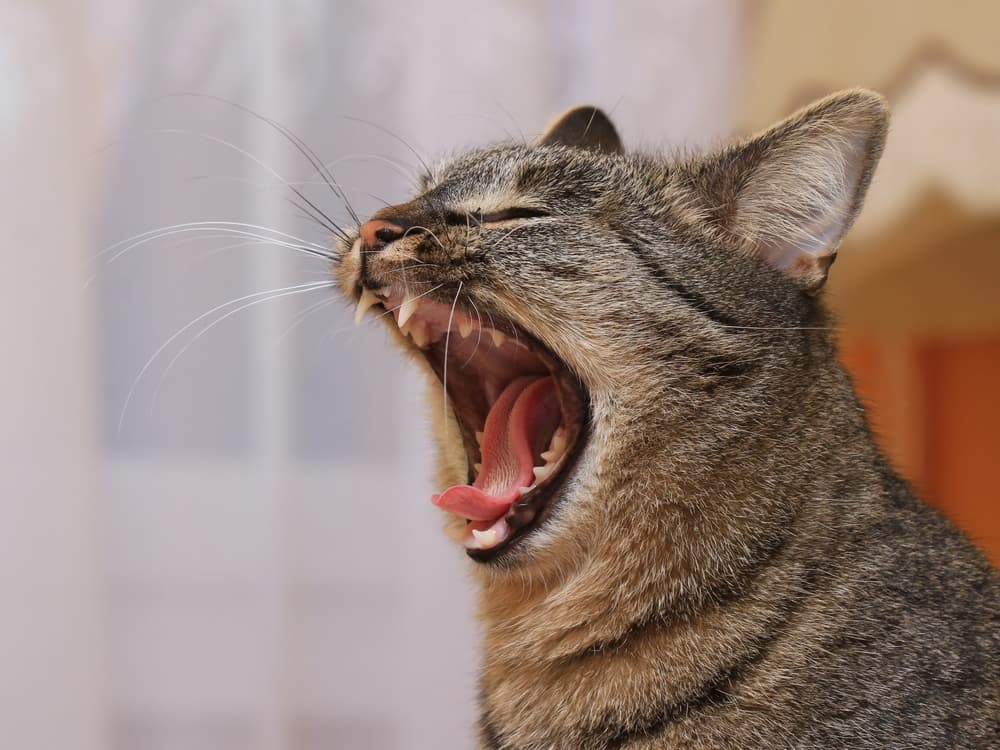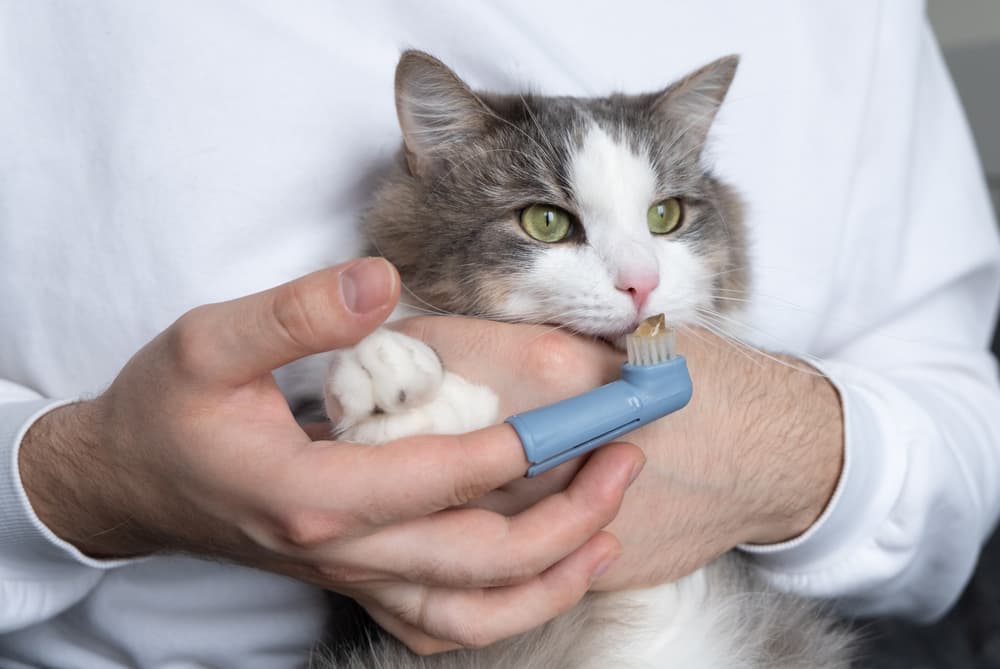Cat Bad Breath: Causes and Solutions

Overview
- Cat breath shouldn't have much of an odor, so a stinky cat mouth could signal an issue.
- A variety of conditions can impact cat breath, including gum disease, oral issues, and non-mouth disorders
- If you notice your cat has bad breath, schedule a veterinarian appointment.
- Home remedies for bad cat breath include teeth brushing and dental wipes or sprays.
- Regular brushing, cat dental treats, and water additives can help prevent bad breath in cats.
A good snuggle often gets you up close and personal with your cat, whether they’re nestling under your chin, curling up on your chest, or delivering a nice headbutt to the face to let you know it’s time to wake up for breakfast.
These snuggles will also often give you a close encounter with your kitty’s breath. But contrary to what you might think, cat bad breath isn’t normal. Cat breath shouldn’t really have an odor, unless, of course, you just fed them something pungent like tuna or sardines.
If your cat’s breath consistently stinks like garbage or something that died, or if the odor of your cat’s breath changes suddenly, it’s a sign that something isn’t right. In this article, we’ll dive into the causes of cat bad breath, how to treat it, and things you can do to prevent it.
What Causes Bad Breath in Cats?

If you’re noticing a distinct stink coming from your kitty’s mouth, you’re probably wondering: why does my cat have bad breath? Also known as halitosis, bad breath can affect any breed of cat and isn’t known to target certain breeds more than others. It can be caused by many different things.
Gum Disease
By far the most common cause of bad breath in cats is periodontal (gum) disease. By only two years of age, 70% of cats will have some form of periodontal disease [1]. Just think about what your breath would smell like and the reaction you’d get from your dentist if you didn’t brush your teeth for weeks, or even years! Since cats can’t brush their own teeth, they rely on us human parents to take care of their teeth for them, and unfortunately, we aren’t always great at this task.
Why does gum disease cause bad breath in cats? As soon as a cat eats a meal, plaque (a sticky substance containing food particles, saliva, and bacteria) starts to accumulate on the surface of their teeth. If this plaque is not removed by brushing or other methods, it will harden and turn into tartar within a few days. Tartar, which has a yellow-to-brown color, is rough and will then attract more plaque, which leads to more tartar – it’s a vicious cycle.
Plaque and tartar accumulation first causes gingivitis, or inflammation of the gums. If this isn’t treated in time, it will eventually lead to inflammation of the deeper tissues supporting the teeth, which then causes infections below the gums and eventually tooth loss. All of this infection, inflammation, and tooth decay creates very bad cat breath.
Oral Conditions
Aside from gum disease, there are other oral conditions that lead to bad breath in cats. Diseases that cause ulcers in the mouth, such as infections with feline calicivirus and kidney failure, are all associated with halitosis. Cancerous tumors, stomatitis, broken teeth, and foreign objects lodged in the mouth or nose can also cause bad cat breath.
Non-Mouth-Related Conditions and Disorders
Conditions aside from issues related specifically to the mouth are yet another source of bad breath in cats. However, there will almost always be other symptoms besides bad breath alone that accompany these disorders, including vomiting, diarrhea, low energy, excessive thirst, excessive urination, and a poor appetite.
Other things that may lead to bad breath include disorders of the digestive system and liver – especially those that induce frequent vomiting. Additionally, if not well controlled, diabetes can cause your cat’s breath to smell weird, sort of like nail polish remover.
What to Do if Your Cat Has Bad Breath

There are many things that can be done for cats with bad breath. If you notice that your cat’s breath smells, it’s best to schedule a visit with your veterinarian. They will start with a physical exam to check your cat’s teeth/gums and the rest of their body.
If your cat has red, puffy, or receded gums, or missing or broken teeth, the next step will be to schedule them for an anesthetic dental cleaning. Most veterinarians will perform pre-anesthetic bloodwork, which will also allow them to ensure that your cat’s internal organs are functioning properly and not contributing to the bad breath. The dental cleaning should include full mouth radiographs (X-rays), which allow for a full assessment of the health of your cat’s teeth and gums and help determine if there are any severely diseased teeth that may need to be removed.
If your veterinarian finds another cause of bad breath unrelated to the teeth and gums, such as untreated diabetes, your cat’s breath should improve once the disease is properly treated.
Cat Bad Breath Home Remedies

After you’ve gone to your veterinarian to make sure there’s not a serious problem causing your cat’s bad breath, there are some things you can do at home to help improve the condition.
Unsurprisingly, a tried-and-true remedy for smelly breath is brushing your cat’s teeth. Always use a toothpaste that is specially formulated for pets to ensure that it is safe. Many pet toothpastes are enzymatic. meaning that the toothpaste itself will help to remove plaque even on spots you cannot reach.
If you have never brushed your cat’s teeth before, it is important to start slowly with a finger or finger toothbrush and reward them with a tasty treat afterward. This will help your cat build a positive association with having their teeth brushed. However, some cats may not allow you to brush their teeth no matter what you do.
The good news is that there are dental wipes, sprays, water additives, treats and prescription diets that have been proven to reduce the accumulation of odor-causing plaque. You can find the names of these products approved by the Veterinary Oral Health Council at VOHC.org. Your veterinarian can also make recommendations on additional products to address bad breath.
How to Avoid Bad Cat Breath

The best thing you can do to prevent bad breath in your cat is to institute some form of daily home dental care into their routine. Brushing your cat’s teeth once a day is the most effective way to do this.
If daily brushing does not work for you or your cat, it is important to find the right thing or mix of things that you can do on a daily basis to promote good oral hygiene. For example, it might be more realistic for you to wipe your cat’s teeth with dental wipes twice a week and to feed her dental treats every single day.
The next best thing you can do is to have your cat’s teeth cleaned and evaluated under anesthesia by your veterinarian on a yearly basis. The current recommendation is for cats to start receiving annual dental cleanings at one year of age [2].
Keeping your cat’s mouth clean and free of bad odors will not only prevent them from developing painful, diseased teeth later in life, it can also help to promote better heart, lungs, kidneys, and liver function, and improve their overall longevity.









